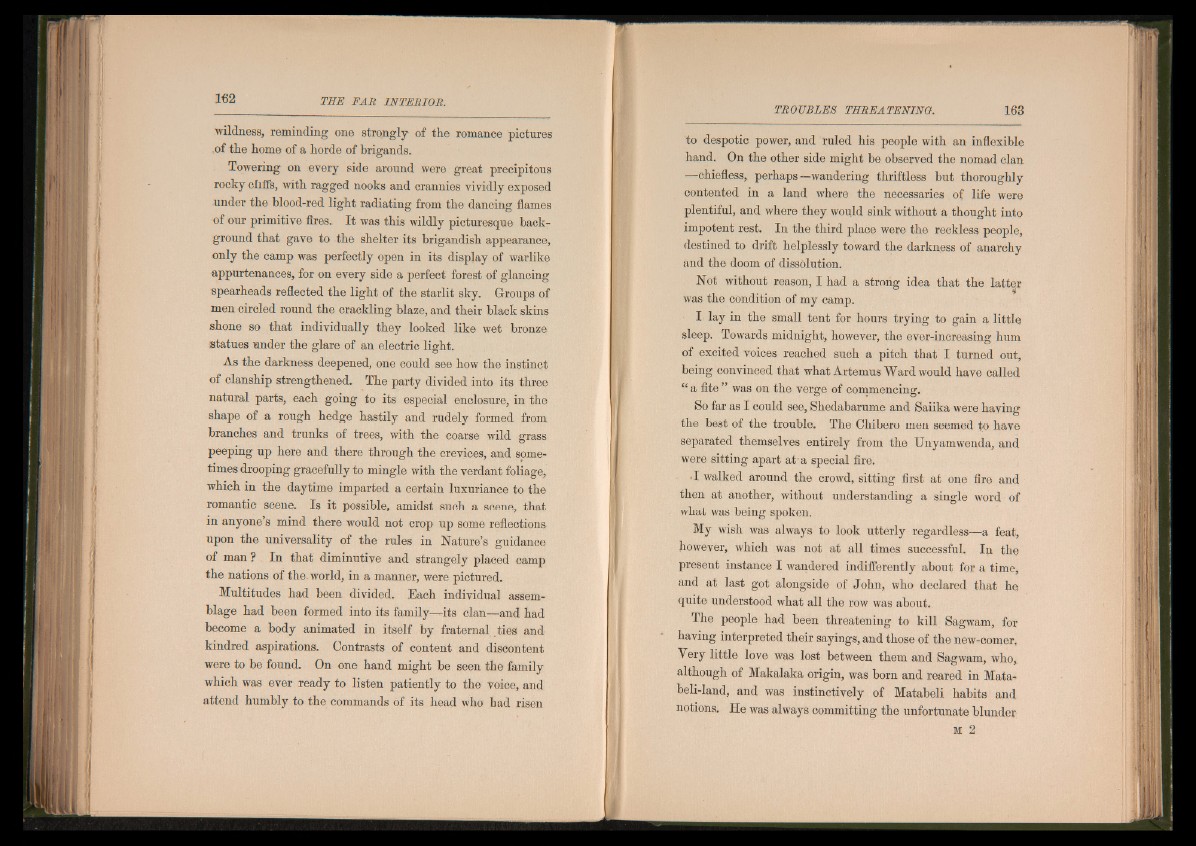
wildness, reminding one strongly of the romance pictures
of the home of a horde of brigands.
Towering on every side around were great precipitous
rocky cliffs, with ragged nooks and crannies vividly exposed
under the blood-red light radiating from the dancing flames
of our primitive fires. I t was this wildly picturesque background
that gave to the shelter its brigandish appearance,
only the camp was perfectly open in its display of warlike
appurtenances, for on every side a perfect forest of glancing
spearheads reflected the light of the starlit sky. Groups of
men circled round the crackling blaze, and their black skins
shone so that individually they looked like wet bronze
statues under the glare of an electric light.
As the darkness deepened, one could see how the instinct
of clanship strengthened. The party divided into its three
natural parts, each going to its especial enclosure, in the
shape of a rough hedge hastily and rudely formed from
branches and trunks of trees, with the coarse wild grass
peeping up here and there through the crevices, and sometimes
drooping gracefully to mingle with the verdant foliage,
which in the daytime imparted a certain luxuriance to the
romantic scene. Is it possible, amidst such a scene, that
in anyone’s mind there would not crop up some reflections
upon the universality of the rules in Nature’s guidance
of man ? In that diminutive and strangely placed camp
the nations of the world, in a manner, were pictured.
Multitudes had been divided. Bach individual assemblage
had been formed into its family—its clan—and had
become a body animated in itself by fraternal ties and
kindred aspirations. Contrasts of content and discontent
were to be found. On one hand might be seen the family
which was ever ready to listen patiently to the voice, and
attend humbly to the commands of its head who had risen
to despotic power, and ruled his people with an inflexible
hand. On the other side might be observed the nomad clan
—chiefless, perhaps—wandering thriftless but thoroughly
contented in a land where the necessaries of life were
plentiful, and where they would sink without a thought into
impotent rest. In the third place were the reckless people,
destined to drift helplessly toward the darkness of anarchy
and the doom of dissolution.
Not without reason, I had a strong idea that the latter
was the condition of my camp.
I lay in the small tent for hours trying to gain a little
sleep. Towards midnight, however, the ever-increasing hum
of excited voices reached such a pitch that I turned out,
being convinced that what Artemus Ward would have called
“ a fite ” was on the verge of commencing.
So far as I could see, Shedabarume and Saiika were having
the best of the trouble. The Chibero men seemed to have
separated themselves entirely from the Unyamwenda, and
were sitting apart at a special fire.
•I walked around the crowd, sitting first at one fire and
then at another, without understanding a single word of
what was being spoken.
My wish was always to look utterly regardless—a feat,
however, which was not at all times successful. In the
present instance I wandered indifferently about for a time,
and at last got alongside of John, who declared that he
quite understood what all the row was about.
The people had been threatening to kill Sagwam, for
having interpreted their sayings, and those of the new-comer,
Yery little love was lost between them and Sagwam, who,
although of Makalaka origin, was born and reared in Mata-
beli-land, and was instinctively of Matabeli habits and
notions. He was always committing the unfortunate blunder
M 2